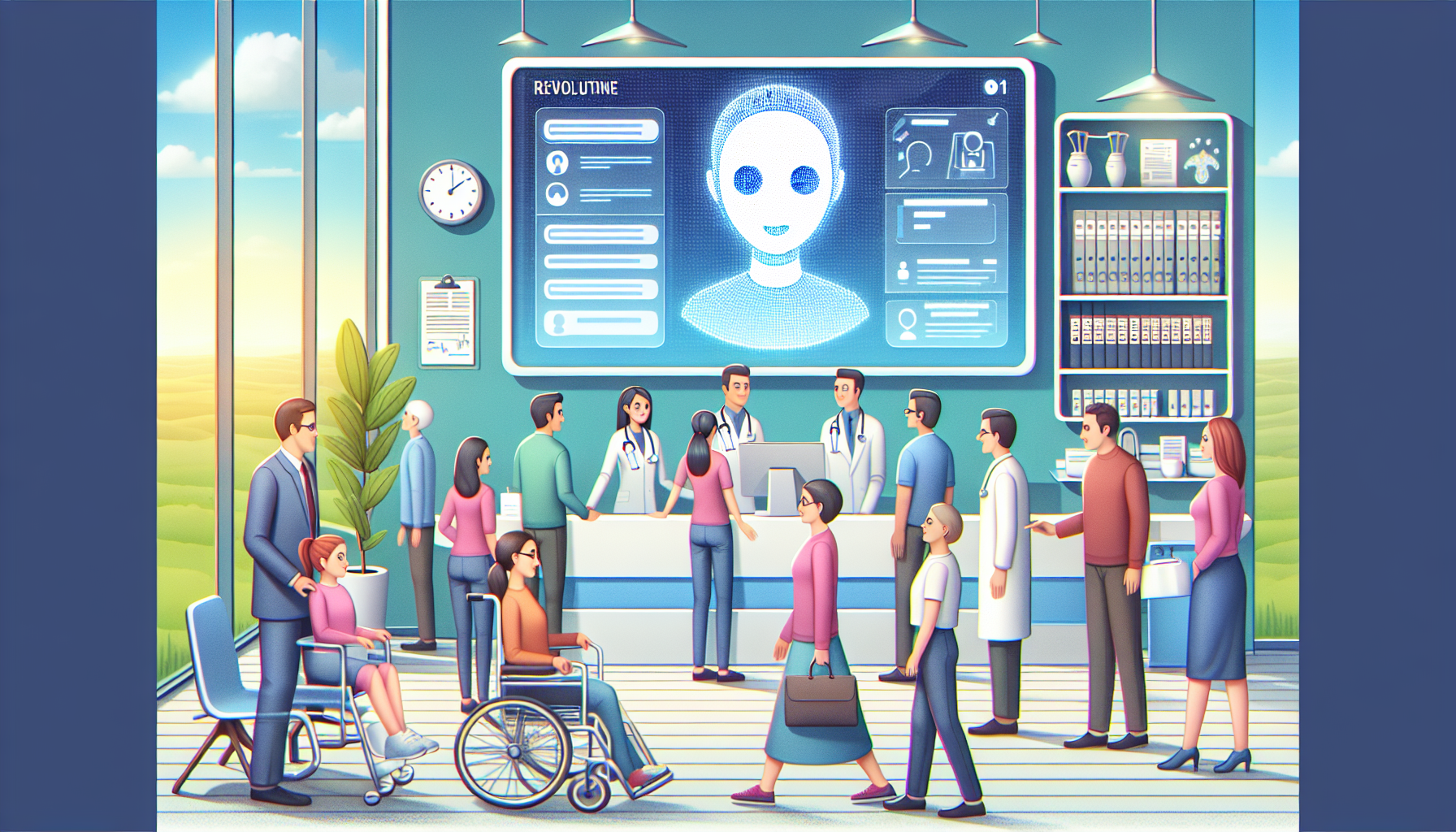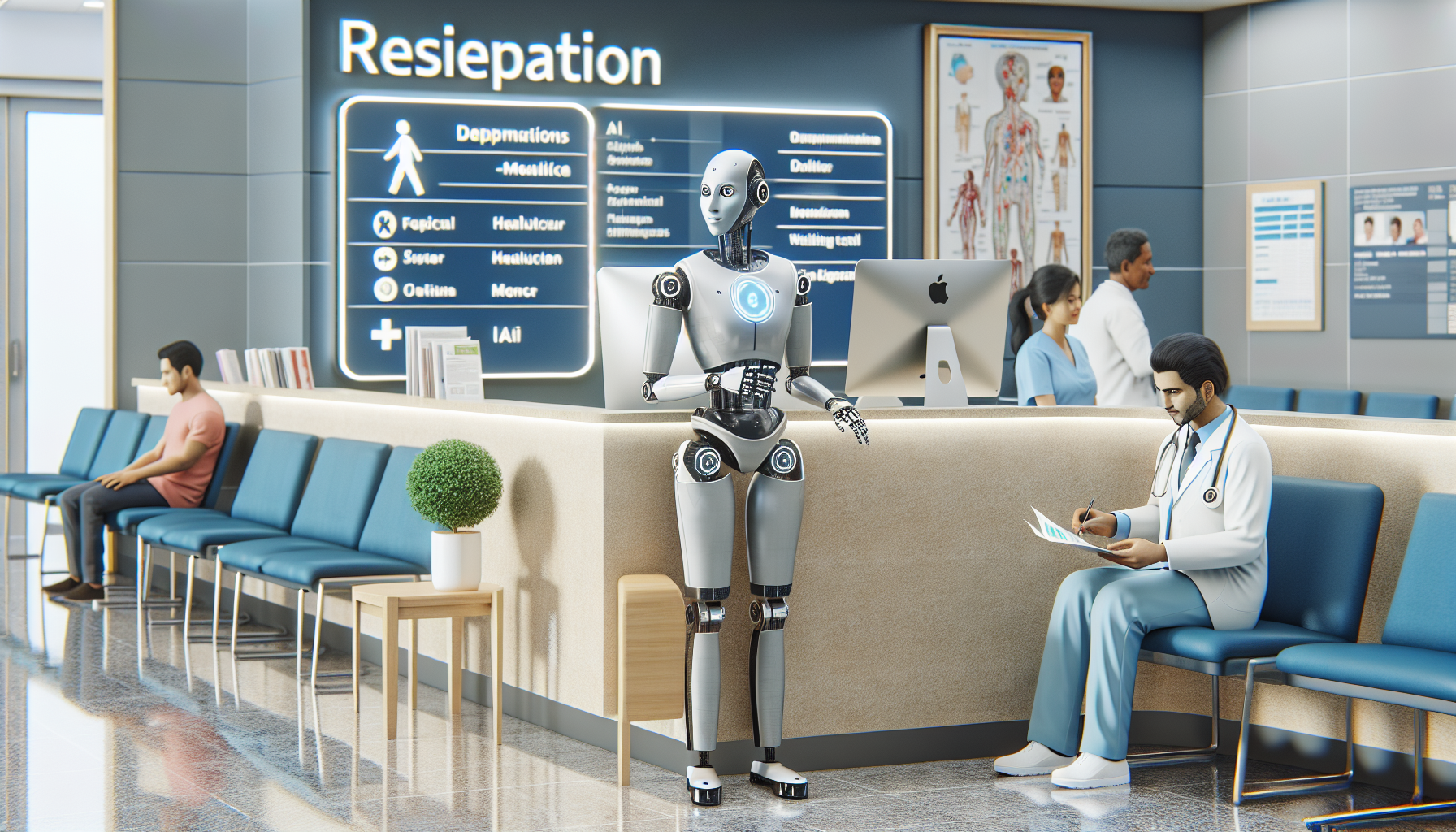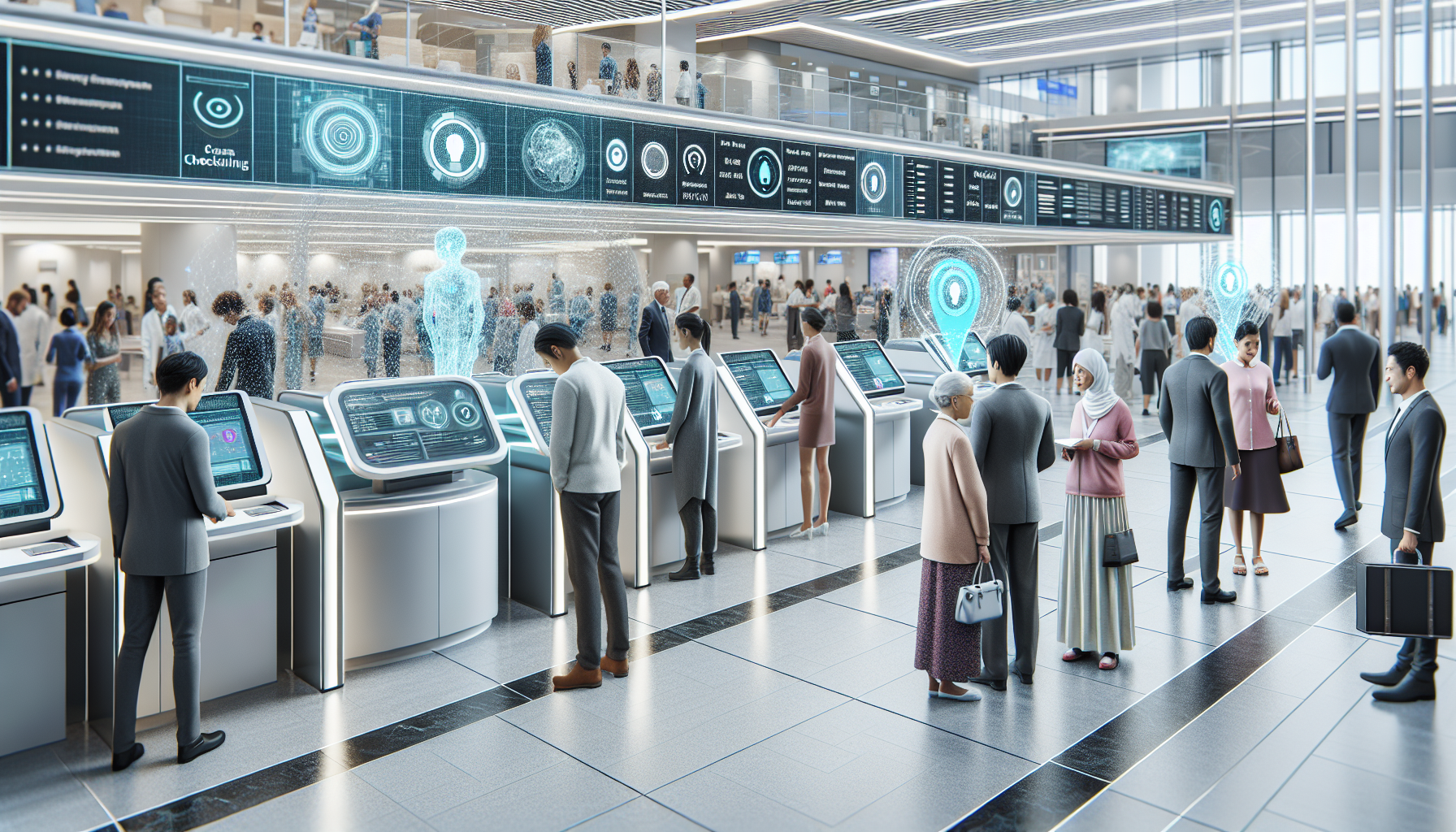
Introduction to AI Receptionists in Healthcare revolves primarily around the development and implementation of Artificial Intelligence (AI) in the medical field, particularly in the role of receptionists. A shift from human-based administrative roles to automated, AI-driven processes is rapidly transforming the healthcare industry, revolutionizing patient interactions and administrative procedures.

AI receptionists, known for their efficiency, accuracy, and tireless work ethic, eliminate many of the common errors and time constraints associated with human receptionists. They have the potential to significantly change the current healthcare model, from appointment scheduling to patient data input and beyond.
AI receptionists come with various advantages, such as 24/7 availability, precise data recording, instant information retrieval, and multi-tasking capabilities. They can also greatly alleviate the workload of overburdened healthcare practitioners, giving them more time to focus on patient care. Furthermore, they provide advanced data analytics, offering valuable insights that can aid in enhancing healthcare services.
However, the adoption of AI receptionists is not without challenges. There are concerns about patient privacy, the learning curve involved in using new technologies, and how the ‘human touch’ can be maintained in the era of automation. Despite these concerns, it’s evident that the unstoppable march of technology, especially AI, will continue to shape the future of healthcare.
In the following sections, we will delve deeper into how AI Receptionists are revolutionizing medical practices, redefining patient experience, and streamlining administrative duties. Stay tuned.
The advent of artificial intelligence (AI) has brought a myriad of advancements in various fields, among which, the healthcare sector stands out tremendously. More specifically, AI receptionists are steadily becoming crucial components of medical operations, offering unprecedented benefits in terms of patient experience, and indeed revolutionizing healthcare.
One of the foremost advantages that AI receptionists provide is the significant reduction in wait times. The capacity for efficient multitasking enables these AI entities to instantly address multiple inquiries and concerns simultaneously, which human counterparts may find challenging. Research has shown the positive impact of reduced wait times on patient satisfaction, an aspect paramount to the healthcare experience.
Moreover, the capability of AI receptionists to personalize greetings based on individual patient information adds a touch of personalized attention and comfort. AI systems are adept at learning patients' preferences and behaviors, thereby fostering a more tailored and individualized healthcare environment. Not only does this promote a more comfortable and satisfying experience for the patient, but it also enables healthcare providers to deliver better care quality.
Furthermore, the efficiency of AI receptionists is highly observable in scheduling tasks. Their capacity to handle large volumes of data and make intelligent decisions streamlines the appointment process. This results in a more organized system of patient scheduling, ensuring that everyone receives timely service and the medical professionals can work in a more controlled and patent-focused environment. A study confirms the potential of AI in enhancing clinical productivity, with patient scheduling being one of the areas greatly improved.
Undoubtedly, AI receptionists are the step forward in revolutionizing the healthcare sector through technological advancement. They present a striking example of how AI can be a transformative innovation, particularly in enhancing patient experience in healthcare service delivery.
In an era where technology continues to drive innovation, the healthcare sector is not left behind. Artificial Intelligence (AI), particularly AI receptionists, are transforming the conventional processing of medical practices. Through their integration, administrative tasks such as data entry, appointment scheduling, and patient record management can be optimized.

One of the significant properties of AI receptionists is their capability of improving data entry. This mundane task obliges accuracy and precision, which AI receptionists can seamlessly fulfill. Using machine learning algorithms, they can extract, sort, and analyze data from various sources in real-time. This reduces human error, boosts efficiency, and leads to better patient care. Take, for instance, the AI system developed by Aidoc, which uses advanced deep learning algorithms to improve radiology reports.
Next, we have appointment scheduling. With an AI receptionist, the practice of arranging appointments becomes largely automated, accommodating patient requests 24/7. AI can even handle cancellations and rescheduling, far removing the common errors associated with manual booking. AI-powered systems like Zocdoc streamline this process, offering patients an accessible platform to manage their medical appointments.
Lastly, AI receptionists revolutionize patient record management. By automating the process, important patient histories and documents can be located, updated, and categorized more accurately than by manual methods, thus eliminating issues of misplacement or misfiling. AI technology like IBM Watson Health demonstrates how AI can swiftly analyze vast amounts of patient data, making a substantial impact on administrative efficiency. This ultimately results in lower operational costs and reduced errors, molding a patient-centric approach in healthcare practices.
Technologies like AI receptionists don't merely increase efficiency; they transform procedures, benefitting patients and healthcare providers alike. By reducing the time and resources spent on administrative tasks, more focus can be dedicated to direct patient care and improving health outcomes. AI is unquestionably revolutionizing healthcare, and its effects will continue to impact the industry positively.
The advent of technology has ushered in a new era in healthcare, known as digital health. This encompasses the convergence of digital and genomic revolutions with health, healthcare, living, and society. In particular, the integration of AI receptionists with existing healthcare systems has the potential to greatly transform and streamline medical practices.
One of the core ways in which AI receptionists integrate into existing systems is through the facilitation of quick access to patient records. An AI-powered digital front desk can retrieve and manage comprehensive patient data easily, reducing the manual work and time typically required of human receptionists. These systems guarantee that all patient information is accurate, up-to-date, and consistent across all platforms.
Another key benefit of AI receptionists is their ability to enhance workflow efficiency. They accomplish this by automating appointment scheduling and follow-ups, managing waiting lists, and offering prompt responses to patient queries. This automation capability frees up time for medical staff to focus on direct patient care.
Perhaps the most dynamic aspect of AI receptionists is their ability to learn and improve over time. Employing machine learning algorithms, these smart systems evolve continually, tailoring their functionalities to better meet the specific needs of a medical practice. In doing so, they elevate the level of personalized care that patients receive.
In summary, the adoption of AI receptionists in healthcare is more than just a wave of the future – it’s a transformative movement that's reshaping the landscape of medicine today. By integrating seamlessly with existing healthcare systems, these technological wonders drive data consistency and improve workflow efficiency, ensuring that healthcare providers can deliver superior patient care.
In the ever-evolving field of healthcare, emerging technologies such as AI-based receptionists have started to play an integral role in enhancing administrative efficiency and patient satisfaction. This technological breakthrough has proven its value through several compelling success stories across diverse healthcare settings.

One compelling example is the deployment of AI-powered virtual receptionists at multi-specialty clinics. In this setting, AI receptionist systems like SolvHealth have facilitated instant patient registration and seamless appointment scheduling.
There has been a significant reduction in patient wait times and overall administrative burden. Most notably, the patient feedback for this technology has been overwhelmingly positive, citing the convenience amid busy schedules as a major advantage.
AI-based receptionists have also found their place in dental practices. Using platforms like Denticon, these practices have seen a substantial improvement in administrative effectiveness. With automate patient reminders, insurance verification, and billing, the administrative teams can focus more on patient care and less on paperwork.
But perhaps the greatest testament to the impact of AI receptionists in healthcare is their implementation in large hospitals. With the adoption of AI-based systems like Google Cloud Contact Center AI, these institutions have reported better patient experiences, streamlined workflow management, and considerable cost savings.
The successful implementation of AI receptionists in these diverse settings underlines their potential in revolutionizing healthcare. The way forward is clear: continued innovation and adoption of AI-based solutions will drive the future of healthcare, making it increasingly effective and patient-centered.
While the prospect of AI-driven receptionists simplifying numerous operations in healthcare is promising, several challenges arise which need to be addressed. The integration of AI receptionists often invites concerns regarding privacy and the accessibility of personal health data. As AI systems are essentially advanced algorithms, breaching them could potentially uncover sensitive medical information.
Similarly, the human factor cannot be completely disregarded. Acceptance among patients, especially the older population, could be a hurdle to widespread implementation of AI receptionists. Regardless of how efficient these AI models may be, they cannot replace the warmth and empathy of a human interaction.
The technical constraints in implementing AI are also noteworthy. Many such systems require continuous internet access, a sophisticated infrastructure, and regular system updates to function optimally. Recent studies have shown that limited network coverage and technological literacy can greatly obstruct the practicality of implementing advanced AI healthcare systems, particularly in rural or low-income regions.
Moreover, there is a growing concern surrounding AI transparency and explainability. Clinicians need to comprehend how an AI system reaches its conclusions or recommendations. This attribute, called AI explainability, is critical to wider acceptance and trust among the medical professionals.
Despite these challenges, the feature of AI receptionists in revolutionizing the healthcare sector is a future worth pursuing. Technological advancements are rapidly improving the learning algorithms of AI, enhancing its ability to understand and respond to complex queries. Predictive analytics, pattern recognition, and machine learning are expected to develop significantly over the coming years, making AI receptionists an invaluable element in healthcare.
As the technology matures and regulatory policies keep pace, AI receptionists may soon be a common feature of healthcare practices around the world. Long wait times, appointment scheduling, and patient reminders could be efficiently managed by these advanced systems, resulting in improved patient experience and optimized clinical operations.
Going forward, research will focus on overcoming existing hurdles and further honing the accuracy and efficiency of AI receptionists. This signals not just a transformation in healthcare services but also a new chapter in the way we use technology to better our health.
Start your free trial for My AI Front Desk today, it takes minutes to setup!








